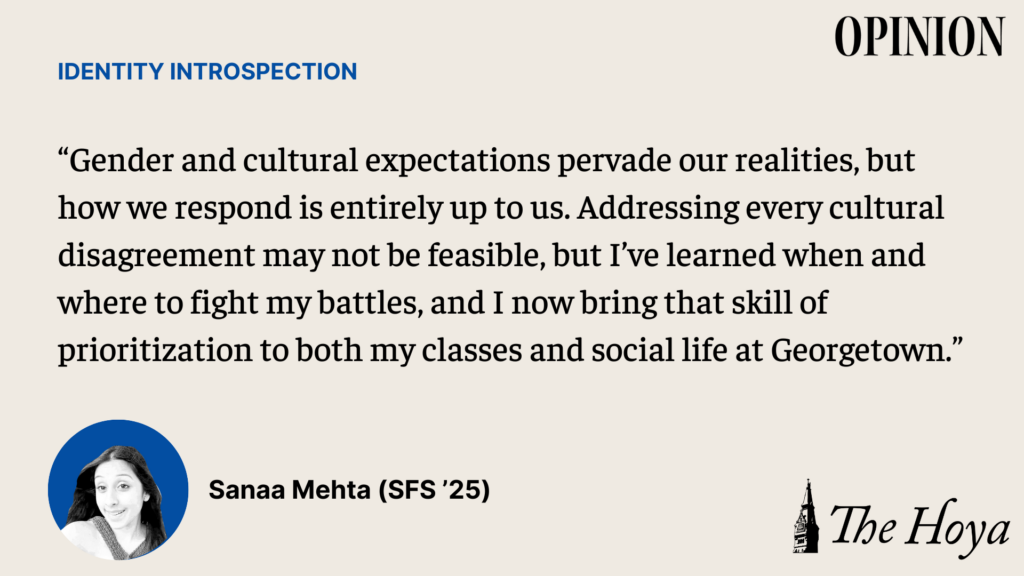Before moving to India, my parents cleaned, cooked and did household chores together. While riding the bus, I watched women in pantsuits rush to work and dads, like mine, drop their daughters at school. Those were my mornings in Manhattan, and now even my mornings in Washington, D.C.
Having met a plethora of Hoyas who have moved around a lot in their childhoods, cultural adjustments are something many of us have faced. On the cusp of my family’s move to India when I was six years old, I didn’t know that the norms were about to change.
From Manhattan to Mumbai, a nuclear family to an extended family, I embraced the riotous introduction to Mumbai life and its technicolor vividness. I got used to my frizzy hair from the humidity and the medley of doorbells announcing food vendors. I learned to fall asleep to sounds blasting from the TV and wake up to my grandmother praying at an ungodly hour. For a while, my baby cousin’s morning cry was my unfailing second alarm.
As life in Mumbai started to flow with its own cadence, I realized that while my cousins — all male — became my best friends, being the first girl in four generations was not always fun.
Nevertheless, as I balanced the chaos of my extended family with the robust support system it offered, I began to not only navigate cultural norms but abide by them. Gender and cultural expectations pervade our realities, but how we respond is entirely up to us. Addressing every cultural disagreement may not be feasible, but I’ve learned when and where to fight my battles, and I now bring that skill of prioritization to both my classes and social life at Georgetown.
Truth be told, my grandparents didn’t know how to handle me, a new addition in their home in 2009. Overwhelmed by having a vocal “American” granddaughter in their traditional, predominantly male family tree, their eyes asked, “What do we talk to her about now?” To them, I was delicate. Emotional. Unknown. Protected by my tigress-with-her-cub mom.
While my grandparents have always celebrated me as a “princess,” they also trap me in a cage of age-old beliefs surrounding gender norms and female fragility. The phrase “don’t hit girls” was often said around me, leaving me confused and wondering, “But we can hit boys?”
I knew I wasn’t fragile and could hold my own with my male cousins in pillow fights and arguments. I recognized my strengths outside just being the stereotypically dramatic, argumentative American girl.
Often, the gender expectations were subtle — like women being served food only after men. Sometimes it struck deeply — like a family member declaring me unfit for business because I was a girl. I bristled. My mom didn’t teach me to curb my tongue, but her hand, squeezing mine under the dinner table, encouraged me to pick my battles.
I did. Most of the time.
I questioned why dad and grandpa got the first servings while simultaneously taking a hot roti with my bare hands and placing it on my mother’s plate. I questioned why my dad didn’t cook anymore. I made sure that I engaged in conversations about the family business. I delicately balanced the positives of a close-knit, large family with its biased outlook.
After eight years in Mumbai living with my grandparents, my parents and I finally moved to our own apartment 10 minutes away. I watched, bemused, as my mom recreated our New York City apartment. She held fast to the image of our Manhattan life; it gave her conviction and patience.
We resumed our pre-Mumbai life, almost resetting my nuclear family dynamics and expectations. The irony here is that I miss the family support and overwhelming presence now that I am here at Georgetown. While gender inequalities are more relaxed here, there is something to say about how much I grew because of my large family and robust culture. Even though I pondered what teenage life in Manhattan would have been like, I would not change my parents’ decision in 2009 to move to India.
Coming to Georgetown, I have grown to appreciate the fact that life teaches us unexpected lessons. While I hadn’t expected to encounter such views within my own family, being open-minded, yet having the courage of conviction, is non-negotiable.
I will carry this with me as I embark on my next adventures in college and beyond. As I reflect on my younger self, holding onto conviction was a skill I had yet to discover and practice. But even with my personal growth, the balancing act between being vocal and dramatic is something I still strive to achieve.
Before, I would get offended and angry if I were doubted or undermined. Now, my aspirations to be patient yet opinionated are cultivated at Georgetown.
Sanaa Mehta is a sophomore in the School of Foreign Service. Identity Introspection is published every third Friday.















Sneha • Mar 26, 2023 at 9:45 pm
Very insightful